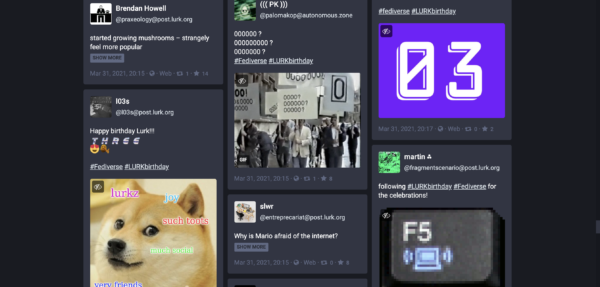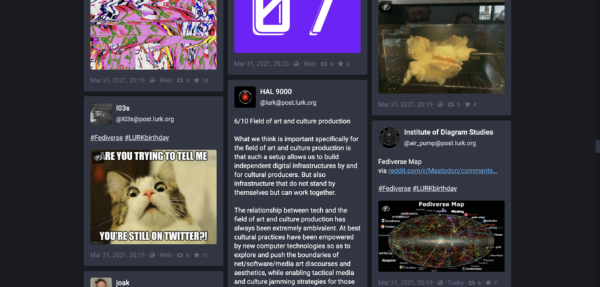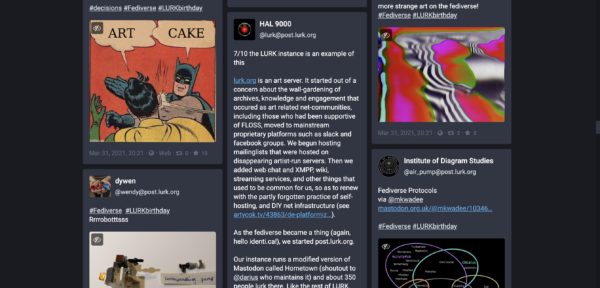If you don’t want a social media network where Jack Dorsey, Mark Zuckerberg or another CEO determines what you can post and which posts are pushed to the top, Mastodon is a good alternative. Mastodon is built as a friendlier version of Twitter and at the moment it’s the biggest decentralised social network. Roel Roscam Abbing & Aymeric Mansoux, both artists and researchers, help run the community platform lurk.org, which runs on a Mastodon server. What is Mastodon? How does it work? And why is it important specifically for the fields of art and cultural production? Roel and Aymeric explained all of this during our event The Hmm ON Alternative Platforms, originally via 10 Mastodon posts. We’ve gathered all of them here, and you can read them below:
1/10 Welcome!
Dear fedi, first of all apologies as we’re going to potentially spam this timeline a bit. We’re introducing the #fediverse to an audience of art and design practitioners, as part of an event dedicated to alternative tools and platforms: https://thehmm.nl/event/the-hmm-on-alternative-platforms. It is a presentation that will take place entirely within the fediverse and best followed through the #fediverse hashtag or here: http://post.lurk.org/tags/fediverse. We are going to divide this presentation in two: a description of the fediverse in general terms, and what it can mean for the field of art and cultural production. In total, there will be 10 toots spread over 10 minutes. During this presentation members and friends of the LURK instance will join us, as it is also a mini #LURKbirthday party for celebrating our 3 year anniversary on the fedi!
2/10 So first things first. What is the #fediverse?
In short, it is a network of mostly social media type sites. But, it is a bit different from other social media you may be used to. There is no fediverse website or fediverse app. Instead, the fediverse is made up of different servers, running different software operated by different organizations and individuals. The fediverse then can be thought of as the shared space between all of those servers (we call them instances).
It is called the fediverse (federation + universe), because the underlying architecture of online federation allows all of these different communities to connect to each other. You may know this model from email, for example, where the service provider (Google, your university, or employer) are detached from the software (Outlook, Mail app, Thunderbird) but you are still able to exchange messages between all of them. Compare that to Facebook, Instagram and Whatsapp. Even though they belong to the same company, you are not able to messages between them (but in the background, they do exchange messages about you 😉 ).
The fediverse is built around this principle, which is why you will find different software but we will return to this in 5/10. #LURKbirthday
3/10 Why is this model of social media interesting?
Because it allows local particularities and singularities to coexist with some sort of global reach at the same time. With that we mean that it permits an online local community and subculture to develop around a specific instance, and at the same time be able to be visible and interact with other communities of practice and net subcultures linked to other instances. It represents an interesting compromise between local cultural diversity and scalability.
Here, local is also an interesting concept because the locality is instance-centric, not geographic, and therefore reconnects with early concepts and infrastructures of thematic online communities that have been overshadowed with the rise of mainstream social media. This process has either absorded these communities into their platforms, or has provided the algorithmic illusion of the one-size-fits-all of a universal global village.
This is on top of the fact that there is also no advertising, no tracking nor any algorithmic timelines that decide what you see or don’t get to see! #fediverse #LURKbirthday

4/10 concretely:
This brings us to the next point. It is a completely different model of social media than Facebook or Twitter. On the fedi there is not one organization or company, with one set of (mostly proprietary) software, with one moderation policy and with one domain with everyone on it.
Instead all these aspects are decoupled from each other, separating the organization, the software, the domain name, the policies, the funding model etc, and leaving up to each instance to decide on these parameters, while experimenting with autonomy in their governance.
This means us on http://post.lurk.org have friends on for example https://scholar.social or https://social.lodis.se/ which each run different software, have a different focus, policies and are run by different groups. They all also ‘see’ different parts of the network depending on who they are connected with.
Of course, this makes things more complicated™, in different ways. New forms of responsibility and agency are gained but at the same time a lot of the things you take for granted become less obvious. How to join? How to find the people you know or find interesting? But also larger issues such as how to sustain the costs of local servers, the labor of running an instance, and of course the people that make the software? #fediverse #LURKbirthday
5/10 diversity
Because of the way it is structured, the strength and the main challenge of the fedi is how to foster and handle diversity.
People will join the fediverse for a variety of reasons and it is also not always an easy co-existance between different communities. There is no single organization that can dictate what is acceptable or not. This for example simultaneously creates a safe space for LGBTQI+ groups, but also for hategroups.
Moderation, how to do it properly, what are the tools that can help, where to draw the line, etc, is constantly debated and is an ongoing issue, but at least it is discussed and experimented with publicly through the fedi but also inside the communities developing the software.
This diversity is also expressed at the level of software. The fediverse is made up of different software projects such as Mastodon, Pleroma, Pixelfed or Peertube. There are also different apps you can use to connect to these servers, and they will all have different approaches and features, from micro-blogging to video streaming.
Here again, the question of cultural diversity is rightfully including and challenging the technical diversity needed and enabled by such an ambitious project. #fediverse #LURKbirthday

6/10 Field of art and culture production
What we think is important specifically for the field of art and culture production is that such a setup allows us to build independent digital infrastructures by and for cultural producers. But also infrastructure that do not stand by themselves but can work together.
The relationship between tech and the field of art and culture production has always been extremely ambivalent. At best cultural practices have been empowered by new computer technologies so as to explore and push the boundaries of net/software/media art discourses and aesthetics, while enabling tactical media and culture jamming strategies for those with a political agenda.
At worst though, art and culture production is completely instrumentalised by the tech industry who are essentially using the field’s cultural capital and practitioners’ precarity to introduce new products and services (NFTs, anyone?). In the case of social media, it turned the field into yet another source of disposable content that can be used to moneytize users eyeballs and mouse clicks.
At the same time we depend on such infrastructures to meet our peers, share and discuss work, create archives, find opportunities and share dank memes. This puts us in a difficult position. #fediverse #LURKbirthday
7/10 the LURK instance is an example of this
https:// lurk.org is an art server. It started out of a concern about the wall-gardening of archives, knowledge and engagement that occured as art related net-communities, including those who had been supportive of FLOSS, moved to mainstream proprietary platforms such as slack and facebook groups. We begun hosting mailinglists that were hosted on disappearing artist-run servers. Then we added web chat and XMPP, wiki, streaming services, and other things that used to be common for us, so as to renew with the partly forgotten practice of self-hosting, and DIY net infrastructure.
As the fediverse became a thing (again, hello identi.ca!), we started post.lurk.org. Our instance runs a modified version of Mastodon called Hometown (shoutout to @darius who maintains it) and about 350 people lurk there. Like the rest of LURK, the instance is about (proto-/post-) free culture, experimental, new media art, net and computational culture, and things like that. https://post.lurk.org is but a tiny part, there are other instances similar to ours! (sonomu.club, merveilles.town, videos.scanlines.xyz, node9.org, social.servus.at, etc) #fediverse #LURKbirthday

8/10 alternative
We believe that the balance discussed earlier between the field of art and culture production and the tech industry, specially the sectors busy with computer technology and network services, is currently broken. It reaches the point where the field of art and culture production is ultimately shaped by social media platforms and novelty software as a service.
At the same time this shaping does not mean knowledge and practices from art and culture inform the platforms they depend on in return. But rather the shaping acts to maintain certain privileges and economic systems in place. Think how decades of pedagogical thinking have been thrown out of the window in the sudden rush to do everything on Zoom It does not have to be like this. #fediverse #LURKbirthday
9/10 baby and bathwater
It does not mean we are convinced that social media is good for artists/musicians/etc, but so far we have not even been able to fully experiment with it ourselves.
As discussed, artists-run servers, mailing list discussions, BBS, and online web forum communities of practices are not new. However, so far, running contemporary social media has been quite out of reach, and our hypothesis is that our current understanding of such online interactions is possibly biased because of our negative exerience with mainstream social media, and also because the potential of these media is underdeveloped due to its skew towards extraction.
Who knows where this is going? We have to try to find out. One of the interesting possibilities of the fedi is to (re)invent what social media is, and what it can be for the field of art and culture production. Making sure that social media doesn’t further change it, but the other way around.
Crucially, for artists and cultural producers it might feel that you need to be where the people are and you have nothing to gain here. However, people will also go where the interesting cultural practices are and therefore you can have a role in forming and shifting attention to alternatives. #fediverse #LURKbirthday
10/10 what to do after the movies
So 1.3 out of 100 of you got all excited about this thing called the #fediverse. How do you join?
You can first have a look at https://joinmastodon.org. A good place to get started. Mastodon is relatively easy to use, the servers listed there have solid moderation policies and are well connected. As you get used to the fediverse and become aware of more specific communities you find interesting, you can just migrate your account in one click and move over!
– If you are interested in joining post.lurk.org contact the organizers of The Hmm as they have a bunch of invite codes to give out.
– If you are the administrator of an instance and are willing to host some newcomers, reply to this thread!
– If you’re interested to know more about the potential and caveats of the fedi, we wrote down some reflections in the following essay.
– @dariusk@friend.camp wrote also on how to build alternative social media communities.
Last but not least, thanks to the Hmm for inviting us for this presentation and thanks to all you who participated! #Fediverse #LURKbirthday